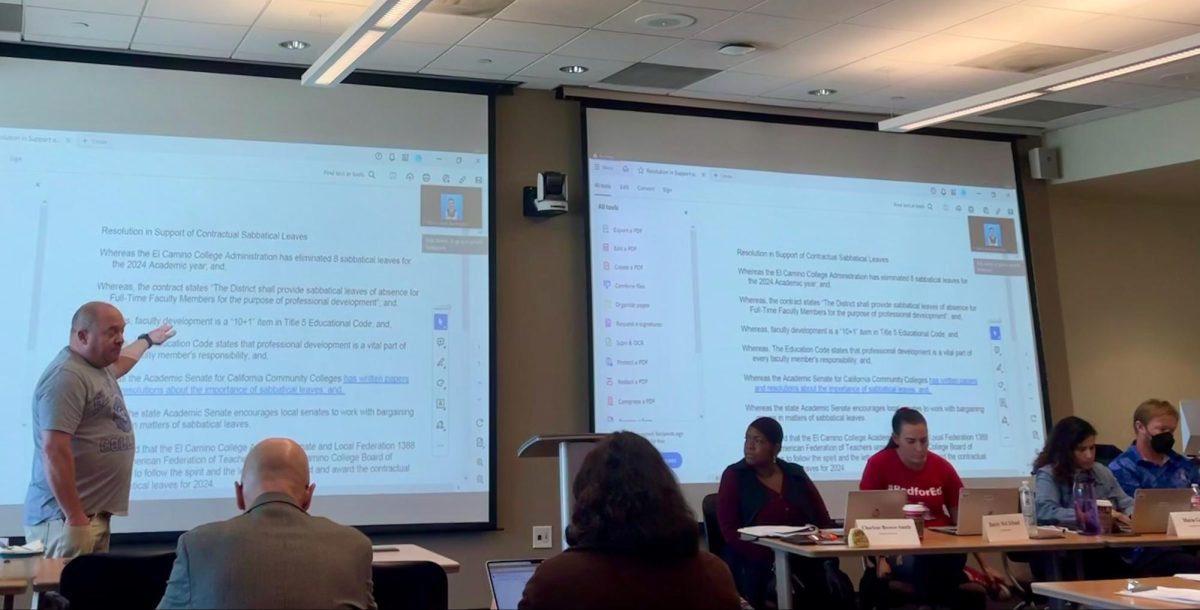The El Camino College Academic Senate presented a resolution in response to budget cuts affecting and cutting down on contractual sabbatical leaves for faculty.
A sabbatical is an approved leave of absence a faculty member takes from regular, contracted instruction time for personal development projects. They are mandated if enforced by a faculty contract.
The El Camino administration decided to eliminate eight sabbatical leaves for the 2024-2025 academic year.
“The administration’s decision to only award four sabbatical leaves for the 2024 academic year overlooks the opinion of the Senate and the Senate’s expertise,” Academic Senate Vice President of Educational Policies Darcie McClelland said.
McClelland said the decision felt “very handed down.”
Kristie Daniel-DiGregorio, a full-time human development professor, said a sabbatical is important to help professors give a better educational experience to students.
“A lot of times what faculty are doing [during their sabbatical] is developing new tools and strategies and resources for students,” Daniel-DiGregorio said. “My sabbatical was on service learning, developing the service learning sites and programs so that students could get experience for their resume.”
Daniel-DiGregorio said faculty bring more to the table when allowed to focus on their work.
According to Article 13 of the tentative contract agreement between the El Camino faculty union and the district El Camino’s full-time faculty are eligible to apply for either a one-semester or one academic year Sabbatical leave, but only after working for six consecutive years.
Faculty members on sabbatical are paid a portion of their full salary, with the exact total depending on certain factors. Sabbatical projects can include but are not limited to returning to school, studying in a foreign country, or writing a book or a computer program.
The resolution was presented by Pete Marcoux, full-time English professor and former vice president of academic technology for the Academic Senate during the Nov. 21 Academic Senate meeting.
Before this resolution, the latest contract had planned to increase the limit of faculty members allowed to be on sabbatical at one time from 12 to eight. With eight spots removed that would only leave four.
Marcoux said resolutions are formal ways that senates talk to their boards and that it is a means of communication for faculty to express their wishes.
“We urge the board to follow the spirit in the letter and award those things, the sabbaticals,” Marcoux said while presenting to the attendees.
President of the El Camino College Federation of Teachers and counselor Kelsey lino also spoke during the meeting.
“The federation wholeheartedly supports this resolution and we fully intend to also follow up on policies and procedures to make sure that we can get our concerns and questions answered,” Iino said.
However, Virginia Rapp, dean of business and a member of the sabbatical leave committee, said the reason why sabbatical leave is being cut down is due to budget issues.
She said the impact remains “budget-wise” for the college’s contractual sabbatical leaves.
“The estimate is that for 12 sabbaticals, it would cost this college about $500,000, that’s not really feasible this year with the college’s budget being as it is,” Rapp said.
As the resolution was being discussed Vice President of Academic Affairs Carlos Lopez addressed the Senate and made a point about the college coming together, especially in light of dismal budget news and around any budget reductions.
Academic Senate President Charlene Brewer-Smith said she is thankful that the faculty got heard and that the conversation was had. She said the resolution was important because it expressed sentiments that “needed to be said.”
“I am hopeful that we will get all of our sabbaticals back,” Brewer-Smith said. “I’m hoping that the budget will support that because it is a good thing.”
Daniel-DiGregorio said faculty are “absolutely willing” to come to the table to collaborate with the administration on finding ways to address the budget issues.
“The main takeaway is that it has to be a process,” Daniel-DiGregorio said. “When we have everyone at the table, sharing ideas, buying into the decision, then we can do the very best for our students.”








